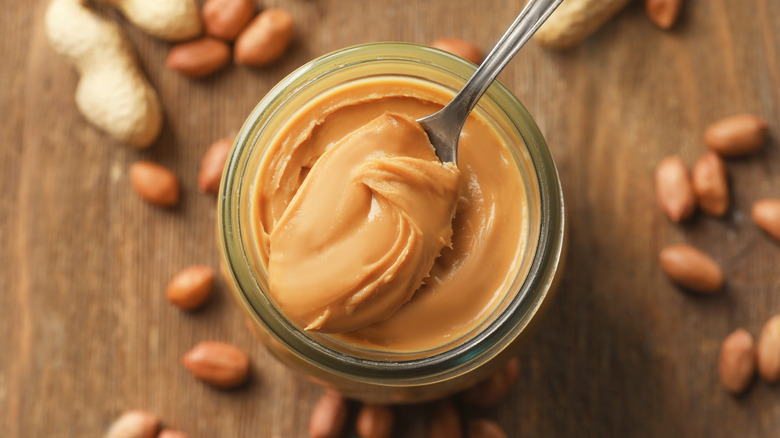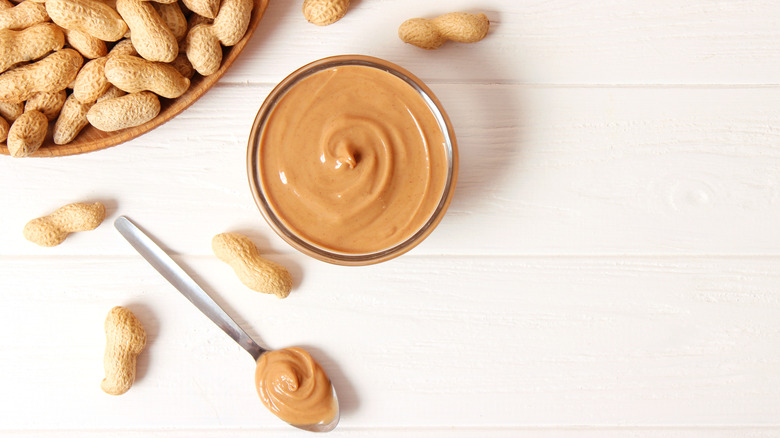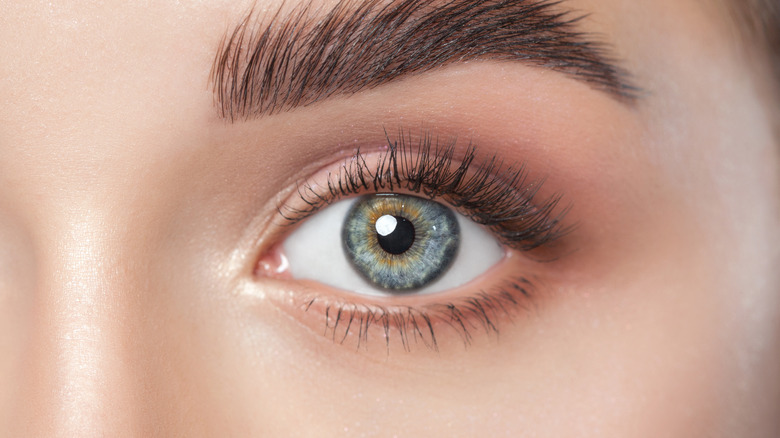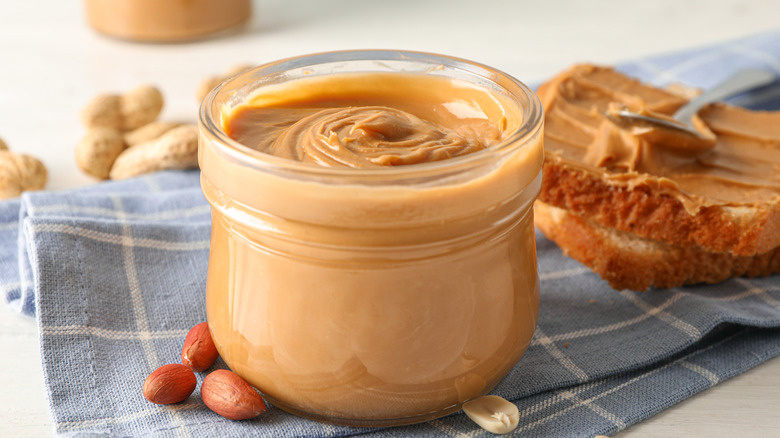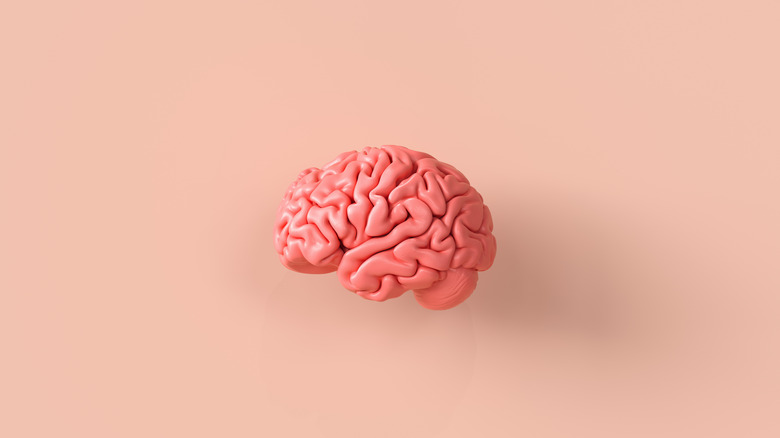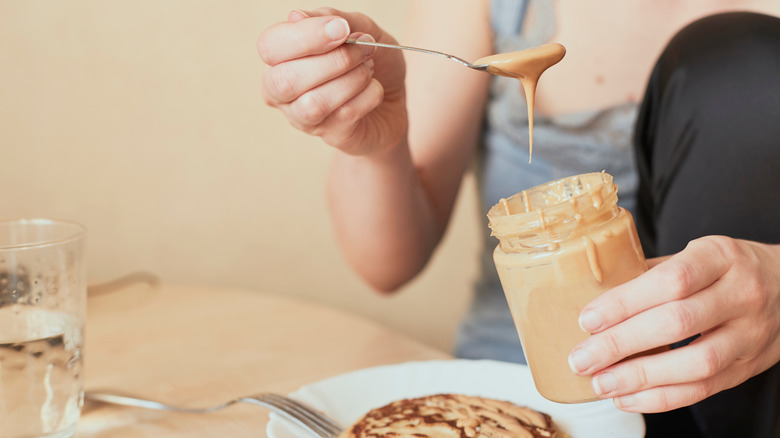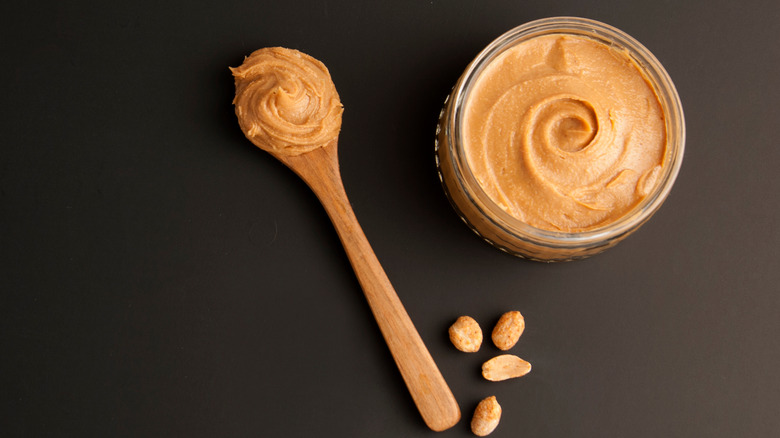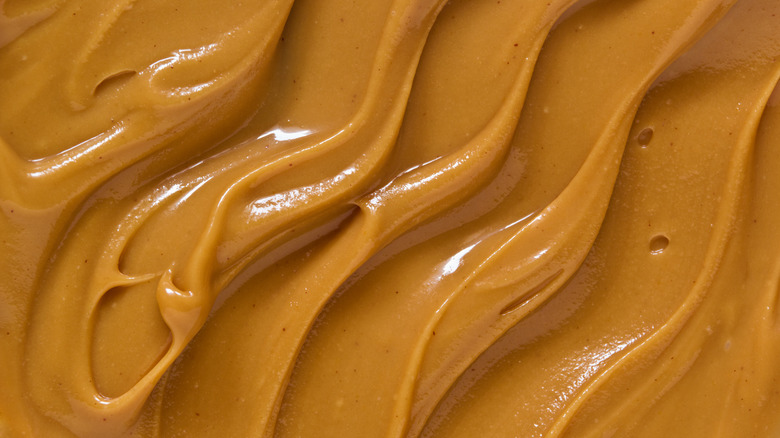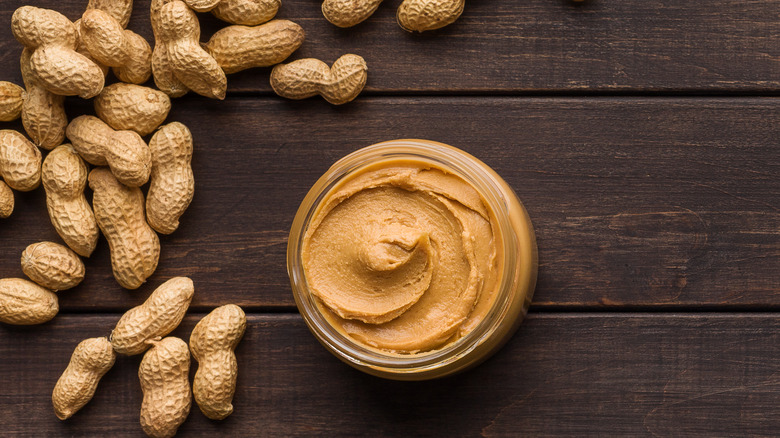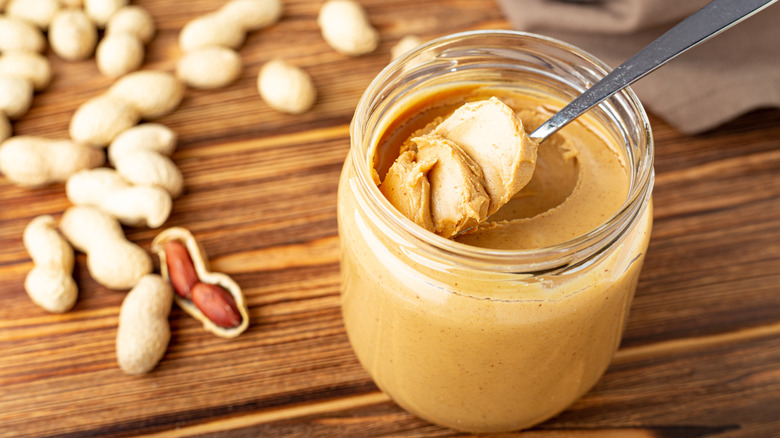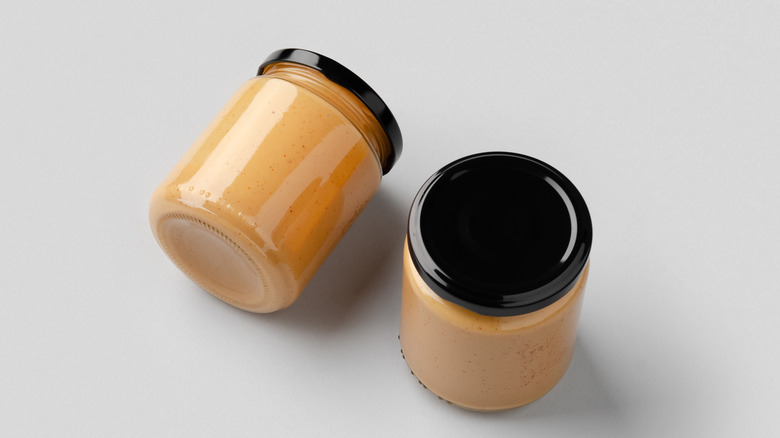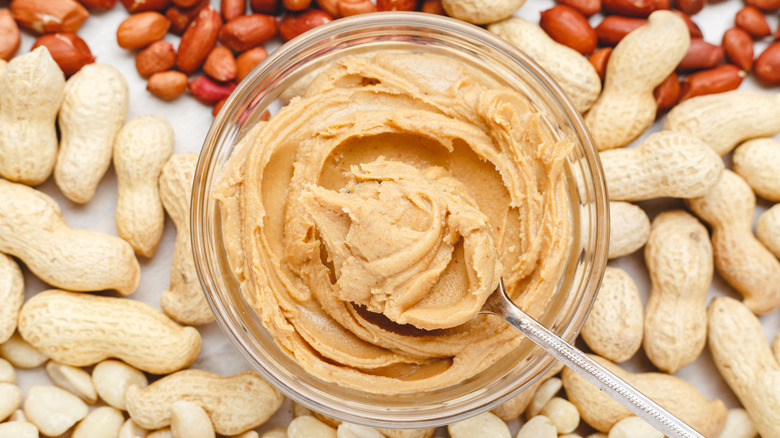What Really Happens To Your Body When You Eat Peanut Butter Every Day
Peanut butter is, quite honestly, hard not to love. Considering you can choose a smooth or crunchy variety and load up your favorite sweet and savory dishes with the spread, there's no questioning why it's still a household staple. And with almost 300 million Americans having consumed peanut butter in 2020, it's fair to say it's a firm favorite.
Peanut butter is a versatile ingredient — equally at home in oatmeal and smoothies as it is in salads and soups, as Epicurious outlined in a list of 33 (!) ways to use the nut butter in recipes. Plus, it packs a serious nutritional punch. Calorie dense and a source of protein, fats, fiber, vitamins, and minerals, per WebMD, it's an efficient way to stock up on nutrients.
But if like countless others, peanut butter makes up a part of your diet, you might be wondering what effect it's having on your body — particularly if you're eating it regularly. And at Health Digest, so were we. We've taken a deep, delicious dive into peanut butter to see what really happens if you eat it every day.
You'll likely increase your nutrient intake when you eat peanut butter daily
With the main ingredient of peanut butter being — wait for it – peanuts (shocking, right?), which are blended into a coarse or smooth paste, you'll be getting a lot of the nut's nutritional profile per daily serving of PB. One aspect of this is the humble nut's vitamin and mineral content. According to WebMD, peanut butter is a great source of several nutrients, which contribute to correct bodily function and good health.
Among these are vitamin E, which is used to maintain blood health and to protect against free radicals (via WebMD). Niacin (aka vitamin B3), also found in peanut butter, is vital for the maintenance of the digestive and nervous system, per the Mayo Clinic. And who could forget about magnesium, essential for muscle and nerve function and the immune system, and manganese, which helps to process energy sources like protein and carbohydrates.
Another B vitamin, B6, can also be found in peanut butter, and it affects a range of things in your body, including mood, appetite, and sleep, as explained by WebMD. Peanut butter is even a great source of zinc which, according to Medical News Today, is "necessary for immunity, protein synthesis, and DNA formation."
Eating peanut butter will help protect your eyesight
The impact that diet can have on eye health is frequently overlooked. Nevertheless, a healthy diet is a factor in preventing the development of eye conditions, as per the Royal National Institute of Blind People. You'll likely be pleased to know that peanut butter could help protect your eyes, especially if you're eating it daily.
This is largely due to the vitamin E content of peanut butter, which is essential for maintaining eye health — particularly when it comes to the prevention of age-related macular degeneration, which damages and reduces central vision over time, according to MedicineNet.
In a study referenced by the site, it was found that vitamin E contributed fairly significantly to macular degeneration prevention, with up to an 82 percent decrease in disease prevalence in some sections of participants.This is welcome news for peanut butter lovers, and even Nutella fans, as hazelnuts are also a good source of vitamin E (via WebMD).
Eating peanut butter will help you maintain muscle mass
If you are looking to build some muscle in the gym — or protect the gains you've already made — you might be happy to hear that eating peanut butter every day could help your muscles stay strong and healthy.
Peanut butter is an energy-dense food, generally supplying around 200 calories and 7 grams of protein per two tablespoons (via Medical News Today). With both adequate calorie and protein intake being essential for the building of muscle, and with protein, in particular, being important for the repairing of it, there's a reason why bodybuilders love this spread.
Peanut butter's healthy fats also play an important role in maintaining muscle health. In combination with protein, the monounsaturated and polyunsaturated fats in your favorite PB can help slow down digestion, therefore stopping the body from breaking down muscle for energy (via Muscle and Fitness).
Your heart health will be protected if you eat peanut butter regularly
With one in every four deaths in America occurring from heart disease (one person every 36 seconds), keeping an eye on our heart health is essential (via Centers for Disease Control and Prevention). If you're a fan of peanut butter, you'll be pleased to know that eating it every day could just help keep your heart in good shape.
This is largely due to the fat composition of peanut butter. Peanut butter contains three different types of fats, saturated, monounsaturated, and polyunsaturated, but it's the latter two that give it its heart-protecting benefits. These good-for-you fats help lower blood pressure and reduce the build-up of plaque in your arteries, which can damage your heart (via Medline Plus).
Luckily, the ratio of healthier fats to the less appealing saturated fats in peanut butter is on par to olive oil, another fat well-known for its heart-healthy qualities, according to Harvard Heart Letter. This is corroborated by a number of studies, which found that people who eat peanut butter and nuts are less likely to develop heart disease than people who don't. Great news for your ticker.
Peanut butter can benefit your brain health
What we eat has a powerful impact on our brain health and function. Our brains are in constant use, after all, and supplying the all-important organ with a healthful supply of nutrients gives it the vitamins, minerals, and antioxidants it needs to maintain good function (via Harvard Health Blog).
The next time you have a spoonful of peanut butter, know that it's supplying you with some of the very nutrients your brain craves to not only keep functioning, but to help prevent certain neurological conditions. One way in which it benefits your brain is through its high vitamin E content, Martha Clare Morris, director of nutrition and nutritional epidemiology in the Department of Internal Medicine at Rush University, told Health. When delivered through food sources like peanut butter, vitamin E is a strong antioxidant that can help protect nerve cells, the death of which is associated with the onset of Alzheimer's disease. As such, eating peanut butter daily could be a great line of defense against the disease.
Your risk of breast cancer could reduce thanks to peanut butter
Breast cancer is the second most common cancer in American women, according to the American Cancer Society. With women having a one in eight chance of developing breast cancer in their lifetimes, taking steps to minimize breast cancer is important. Luckily, if you eat peanut butter daily, you may be reducing your risk of breast cancer — particularly if you're young.
In a study published in Breast Cancer Research and Treatment, the link between intake of vegetable protein and fats and the development of benign breast disease (BBD), a condition that can put you more at risk of developing breast cancer, was studied among pre-adolescent and adolescent girls. The study found that daily servings of vegetable fats and protein from certain foods, including peanut butter, meant a reduced risk of developing BBD. "Girls with a family history of breast cancer had significantly lower risk if they consumed these foods or vegetable fat," the study revealed. With such a powerful association, incorporating regular portions of peanut butter into your diet is a smart idea — especially if you're at particular risk of breast cancer.
If you eat peanut butter daily, you might be getting more sugar than you realize
It's gooey, it's creamy, it tastes excellent — these are just a few reasons why peanut butter is as much of a hit with kids as it is with adults. But before you throw a spoon of peanut butter into a cookie recipe for you or your young'uns, take a sec to check the sugar content listed on the nutrition label.
According to Healthline, there are several commercial brands of peanut butter out there that have various ingredients added to them, including sugar, which could bump up your daily intake if left unchecked. And this excess sugar can end up being problematic for your health.
Added sugars can be especially harmful to heart health, even in kids. One study published in Circulation found "strong evidence" of an association between added sugars and cardiovascular disease in children. Increased sugar intake can also lead to higher risks of many other health conditions such as obesity, higher blood pressure, and diabetes (via Harvard Men's Health Watch).
Peanut butter may help fight inflammation
Chronic inflammation, which the immune system continually attempts to fight, can lead to health complications, according to Harvard Men's Health Watch. And such inflammation can be heavily influenced by diet.
In addition to attempting to consume foods containing antioxidants to battle inflammation, a further way you can combat it is by including sources of Omega-6 fats into your diet. In a review of various studies cited in Harvard Heart Letter, it was found that the consumption of Omega-6 fats led to "either reduced markers of inflammation or left them unchanged."
This is good news if you're eating peanut butter daily as, according to Healthline, peanut butter is a source of Omega-6 fats. For the best benefits, try to also include sources of Omega-3 fatty acids, another type of fat with huge positive effects on our well-being, into your diet (via Cleveland Clinic). Foods like salmon, mackerel, and walnuts are great sources.
Peanut butter can help you manage your cholesterol
As peanut butter is pretty high in fat, you might worry about its impact on your cholesterol. Well, friends, we come bearing good news: If you're eating peanut butter every day, your cholesterol could actually improve.
There are two types of cholesterol: high-density lipoprotein (HDL), or "good" cholesterol, and low-density lipoprotein (LDL), or "bad" cholesterol (via Healthline). HDL helps clear out excess cholesterol from your body, by transporting it to your liver. LDL, on the other hand, is the type that can collect in, and clog up, your arteries.
Whereas consuming saturated fats can raise your LDL levels, consuming monounsaturated and polyunsaturated fats can help reduce LDL and promote the clearing out of bad cholesterol from your body, according to Medical News Today. Although peanut butter contains both saturated and unsaturated fats, it contains much more of the latter, which will benefit your cholesterol. And as keeping LDL in check is essential to reduce the risk of heart attacks and strokes, per the Mayo Clinic, eating peanut butter is a safe bet.
Eat peanut butter and your bones could get stronger
Considering your bones provide the literal framework for your body, looking after them is essential — and your diet directly affects them. If you're eating peanut butter every day, well, you can rest easy knowing that it's excellent for your bone health.
According to Everyday Health, foods that are higher in protein can help build and maintain bone strength. This is because protein helps give the bones their underlying structure, which is then fortified by calcium. When speaking with the publication, Angel Planells, a registered dietitian nutritionist and spokesperson for the American Academy of Dietetics, pointed to peanut butter as an excellent source of protein for these purposes.
Peanut butter is also high in phosphorus, an important mineral. As the "second most abundant mineral in the body," phosphorus is essential for bone and teeth formation, according to MedLinePlus. Having an adequate source of it is vital — which is why regular portions of peanut butter could help keep your skeleton and chompers strong.
You might think peanut butter will cause weight gain, but the opposite may be true
With the high density of calories in peanut butter, it can strike fear into the heart of those looking to lose or keep off weight. However, peanut butter's fat content is largely composed of healthier fats that could help you shed pounds. The monounsaturated fats that are present in peanut butter have been shown to contribute towards weight loss, particularly in diets in which monounsaturated fats take the place of other calories, such as higher levels of carbohydrates, as Healthline revealed.
The link between higher-fat foods like nuts and reduced weight gain was shown in a study published in the European Journal of Nutrition. Researchers looked at weight gain across over 370,000 people and found that those who had a higher nut intake, including peanuts, had less weight gain and risk of becoming overweight and obese.
If you're watching your weight, don't be too put off by the energy density of peanut butter. Eating it every day might just help you reach your weight goals.
You'll get loads of antioxidants when eating peanut butter
Antioxidants are an invaluable element to nutrition, as they fight against free radicals, or waste products created by cells that cause cell damage if not processed (via Medical News Today). Making sure we have a diverse source of antioxidants in our diets is one of the best things we can do for our health.
This should be music to the ears of those of you eating peanut butter daily: Your body is getting a few key antioxidants with each serving. The antioxidant resveratrol found in peanut butter may help reduce the risk of heart disease, and p-coumaric acid (also in PB) has been shown to reduce arthritis, at least in rats (per Healthline).
Peanut butter prepared with peanut skins could deliver an even higher antioxidant content, a 2014 study published in Food Chemistry found. And with diets high in antioxidants having the potential to reduce the risks of several significant diseases including cardiovascular disease and several cancers, eating peanut butter — skins or no skins — daily can have huge benefits for your health (via BetterHealth).
You'll feel fuller longer, thanks to peanut butter's fats and fiber
With peanut butter being a tasty snack, it's perhaps comforting to know that it's also less likely to have you reaching for something else 15 minutes after eating it. According to Healthline, peanut butter can contribute to a lasting feeling of fullness due to its fat and protein content. In particular, higher-fat foods — particularly those which have naturally occurring fats as opposed to ultra-processed foods that have fats added — take longer to digest and promote a feeling of fullness (via Verywell Fit). This will likely lead to you eating less than you would had you chosen a low-fat, high-carb, or otherwise easy-to-digest food.
Peanut butter's fiber content also helps to leave you satisfied. As CNN Health pointed out, 2 tablespoons of peanut butter contains approximately 2 to 3 grams of fiber. Foods with a higher fiber content can be more filling and help us eat less and remain fuller longer, according to the Mayo Clinic. And that's even before the other health benefits that a diet high in fiber brings, including more regular bowel movements, controlling blood sugar, and lowering cholesterol levels.
Eating peanut butter daily could reduce your risk of diabetes
Approximately 37.3 million Americans have diabetes, according to the Centers for Disease Control and Prevention. It's a common condition that can have profound health implications, leading to vision loss, a higher risk of heart disease, and stroke (via Healthline).
It's important to keep an eye on your diets and make choices that could reduce your risk of diabetes. Luckily, eating peanut butter every day could decrease your risk. A 2002 study published in JAMA followed over 80,000 women aged 34 to 59 with no risk of diabetes. Researchers examined the development of diabetes over the cohort and found that the women who ate peanut butter five times or more a week had a much lower risk of developing the metabolic disease.
A word about sugar content, though: Many peanut butter brands add sugar, and consuming too much added sugar can be a serious element in obesity and diabetes risk, according to Harvard Men's Health Watch. Always check the label before you buy.

